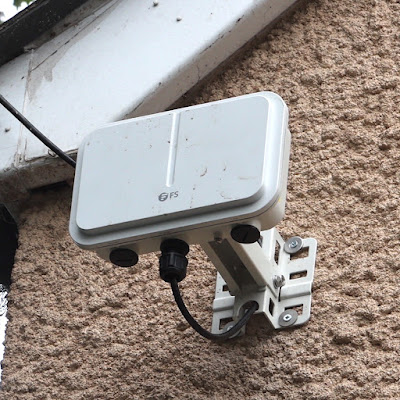I have used Aruba WiFi for some time - they are nice, but expensive. The latest Aruba Instant series seem more sensibly priced though.
When picking WiFi there are a number of factors, but if you are going to get more than just the WiFi that comes with your broadband router you almost certainly want something that can allow multiple access points and roaming between them.
There is also a matter of the number of antenna and radios, and the protocol - summarised as catchy names like WiFi5 and WiFi6, these days. There are also access points for outdoor use, which can be useful.
The Aruba has one cool feature, and the main reason I like it, that it does not need a controller. A controller is what directs devices to move from one access point to another as you move around, and what manages the overall configuration. With the Aruba, the controller is one of the access points, and can even fall back to anther one if the main one is off.
So what changed
I have been pretty happy with the Aruba for many years. It has a lot of features and settings (perhaps too many), and as I say, needs no separate controller.But recently some of my IoT kit (ESP32), which is all 2.4GHz, has been playing up, sometimes sulking not reconnecting to WiFi, and so I felt it was worth changing the WiFI to see if it helped.
Long story short, the WiFi choice was not the cause of that specific problem, and I think I have fixed it. But the change of WiFi had some surprising side effects. For reasons I won't go in to, I have all my 2.4GHz on the same channel. And so that is a pretty full channel. As such I was never surprised to find s/w upgrades on a set of IoT devices was always a bit slow - I set up to do one at a time. To my surprise, with the new WiFi, it is way quicker!
What is the new WiFi?
I have got some kit from FS. It is cheaper than the Aruba, which is a start, but it needs a controller. The controller (AC-1004) is also a 4 port PoE switch which makes it actually useful for a small home installation as you almost certainly want a PoE switch for your access points anyway. So again, not that much extra cost. It can handle 64 APs. I may be a convert to the idea of a controller.
The (web based) controls are a but more clunky than the Aruba, but to be honest, pretty similar. It also has a huge command line interface!
The APs actually come with mounting brackets, unlike the Aruba! I have AP-N505 indoors and AP-T565 outdoors.
So far, so good. I'll see if I am cursing the change in a few weeks. If not, I'll take down the Aruba APs.




"For reasons I won't go in to, I have all my 2.4GHz on the same channel." ... I feel you should go into it... I'm intrigued.
ReplyDeleteThe 2.4GHz is all low traffic IoT, so not an issue, but some modules create their own mesh as well with one elected root to join the WiFi. They have to all be on the same channel. In theory they can elect a root, which can find a wifi AP, and then change the mesh to that channel, but in practice you end up with split meshes which is a pain. Those modules all have battery back up so they can work as a mesh even when no power, wifi APs, or Internet. There are no doubt other ways to sort the problem, but by far the simplest approach is all APs on same 2.4GHz channel.
Delete